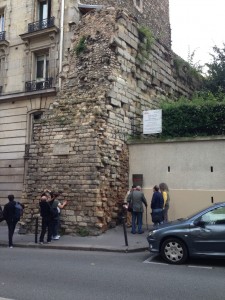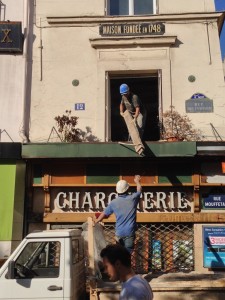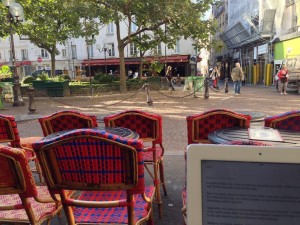In a part of Paris I like, there’s a wall from about the year 1200. In truth, it is only a part of a wall; 40 feet long and maybe 20 feet high.
Near it is a story about the wall in French which I was able to partially read. It tells that when the French King, Philippe Auguste (1165-1223), left to go on one of the Crusades, he had the locals build this wall to protect themselves until he returned.
Apparently, the center of what needed protecting was there at that spot then. Though now, the remains of the wall lie deep within the city almost forgotten, except for the sign on a side street next to it where it is jammed between newer buildings.
Newer is, of course, relative. Just now, I’m sitting in the Delmas Cafe a few blocks away having a coffee and writing this. Just across from me is a building which says it was built in 1748. It’s an ancient looking thing from before the French Revolution. And yet, it is over 500 years newer than the wall. And the building is, itself, over 265 years old now. Don’t get me started; there are Roman ruins here in Paris that I’ve admired, and reverently touched the stones of, that are almost 1000 years older than the wall.
Truly, every thimble-full of dirt under our feet here contains the memories and experiences of men and women beyond counting.
This bit of wall from 1200 is on Rue Clovis between Rue Descartes and Rue du Cardinale Lemoine and not too far from the inestimable and quaint Rue Mouffetard. The latter, which is much beloved by tourists, is a narrow walking street filled with interesting shops and pubs.
I’m sitting in this small square we ‘discovered’ at Rue Mouffetard and Rue Blainville having a coffee and ruminating on my time in Paris.
Just now, some tradesmen are working on the 1748 building and pulling what looks like very old beams out of it. Apparently, someone is having its interior reworked. Hard to tell how old such beams would be. I doubt that they would hail from 1748 but it would be interesting to know their age.
When the wall was built and the King went off to try and wrest control of the Holy Land away from Mohammed’s people, the Americas were untouched save for a few transient Viking villages in New Foundland.
Fenimore’s Mohicans still walked their ancient forest trails; never having dreamed of the white-man or of tuberculosis.
The Central and South American civilizations, with all their alien (from our POV) ways, still flourished and the history that they were evolving was still all theirs.
Deep in the Amazon, vast tracts had been cleared and a charcoal dependent form of agriculture was underway. All of which vanished thoroughly after the European’s maladies swept the Americas. They vanished so well that for a long time, no one believes there had been anything there in the deep Amazon; so quickly did the jungle claim it all back.
We are a species of unintended consequences. Indeed, all of evolution is a dance of unintended consequences; other than the drive to proceed while there yet is energy.
——–
The ancestors of these faces I see passing here were mostly here when the wall was built 800 years
ago. Genetics doesn’t change that much. It swirls into slightly different combinations of forehead and cheek, but it is all here.
You can see that the beauty in women and the strength in men was celebrated in their issue And Paris has a lot of all; beauty, strength and issue.
When the building and the wall were built, a few people held the power and, for the rest, life was an often brutal business lived quickly and with little understanding; save what the church purported to explain.
I look at the faces here and try to see them as the workmen erecting the building then. And I gaze on the women and try to see them as the servant girls or as the wives of peasants and workers.
Occasionally, a face passes me here; haughty imbued with the power of money and self-possession. And I can see them here as well, then. Wearing fine silks and sleeves,. Sure of their God-given right to dominate
———
We’ve come such a long way in the years since the wall and the building went up. But we are still creatures of unintentional consequences; we always have been.
We’ve banished the darkness and fear of diseases not understood. And, though we still die, most of us know now, why and how. And we’ve saved ourselves, for the moment with antibiotics and surgeries, from those dark dreams and we live to see longer lives. But, on yet longer scales, we have also unintentionally enabled the increasing promulgate of genes of lesser and lesser fitness into the pools from which our future will be drawn.
We’ve conquered nature in that no other species can, in the remotest sense, stand against us.
We’ve worked out the division of labor for the greater good and most of us no longer hunt the food we eat nor build the homes we live in. Now, some grow, some build, some supervise and others organize. And all this has raised our standard of living and freed us to have more leisure and more children with less early mortality.
The armies went forth, the armadas went forth, the colonists and the colonizers went forth. And almost without impediment, we’ve nearly filled the world in a few short centuries. All we needed were a few enabling technologies because the drive to go forth was always there in our deep natures.
Technologies do not sleep. Technology begets technology and the increasing leverage, born of the more efficient division of labor, grows stronger for us with each iteration.
As we approach the full point of the world, we are moving faster all the time. There are more of us every moment. We communicate faster, we travel faster, we can make more and we can consume more.
The royal ‘we’ has no idea of what we are doing. Most of us are just lost in the dream of our current life. Our lives are before us and we live them. It’s no one’s fault that the rain forests in Indonesia are vanishing along with the Orangutans.
No one intended any of this. Nature and evolution intend nothing. Energy evaporates down gradients and little creatures arise in the backwash. All the philosophers and saints dancing on the heads of pins are not a pimple on the ass of this simple reality.
—–
So, the morning’s given way to the afternoon as I’ve sat here in the square, watching. The sun that once shone on Mesopotamia shines on me here. And the one that shone on the stones of this earth before the first little creatures crawled from the sea; that very sun shines on me here as well.
The building from 1748 across the square is ignoring me. And the waiter here at the cafe is only marginally better. The royal ‘we’ swirls around me. I intuit in them dreams of youth, of money, of love and a hundred other things in the mix of passing faces.
The simple stones in the building’s wall have been here in the square longer than any of them have been alive; but every face is the center of its own dream.
The “time past and time future” that Eliot mentioned are not here for them. They inhabit the “time now and the time mine” and everything else lies frozen and nearly unseen for them.
No Orangutan calls pierce the square around them.




“…And the seasons, they go round-and-round, and the painted ponies go up-and-down. We’re captured on the Carousel of Time. We can’t go back, we can only look behind from where we came — and go round-and-round-and-round in the Circle Game.” Joni Mitchell, 1970. Thanx, Dennis, for taking me back there. In Paris, it is possible to sit and sip and see the gambol of life pass colorfully, languidly by long enough to recognize, even befriend the motifs when the merry-go-round brings them by again and again. Whether one rides or watches, is actor or scenery, the arcs proceed and recede, the tropes unfold, reify, elude, fade, morph and you are back where you began, the only measure of the distance you traveled and lives you imagined being the number of sips you took along the mobius strip.
I like this story. I had similar feelings in Italy, southern France and Germany. Italy and Germany have great Roman ruins. However, in Achan Germany they have preserved part of a church that was burned during WW2. Same city has some of the oldest Roman Ruins outside of Italy. Walls, Roman baths, etc. When one sits at these sites, one can really get lost in in the moment trying to imagine what it would be like to have lived in those time periods.